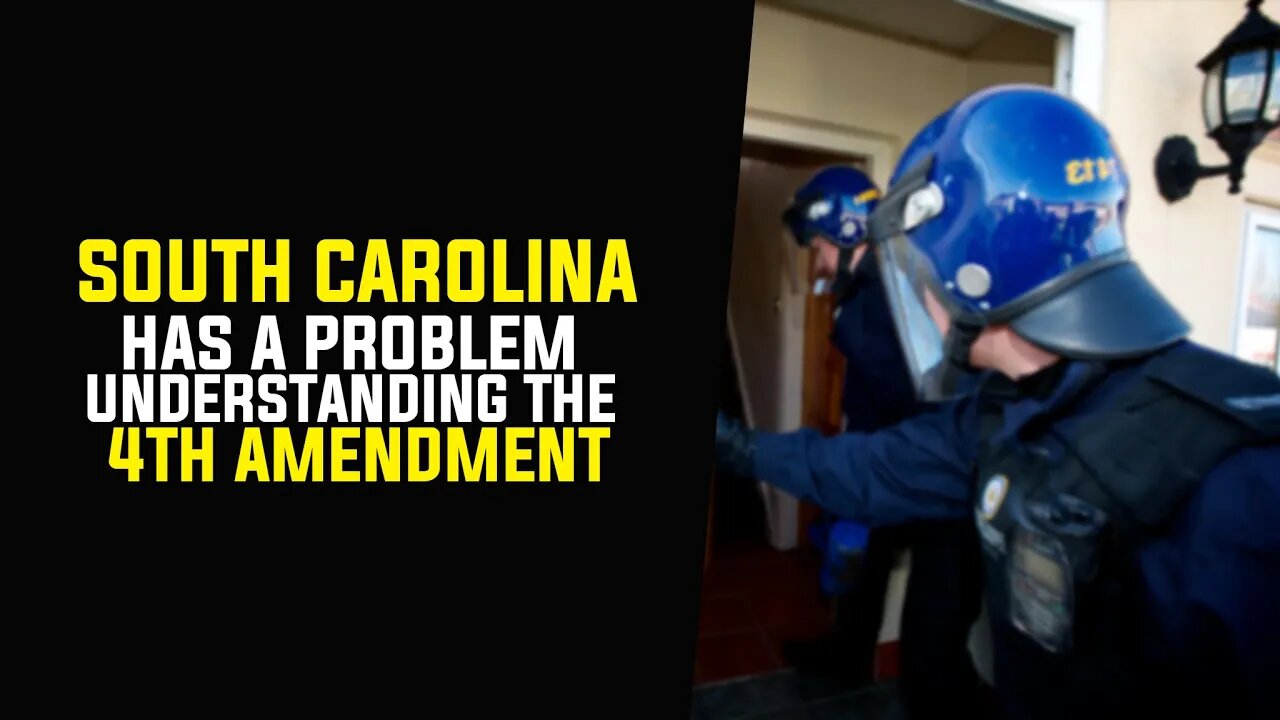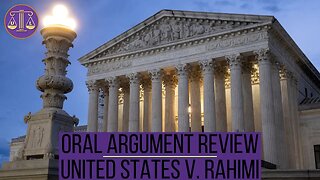Premium Only Content

South Carolina has a problem understanding the 4th amendment
In 2006, the Supreme Court ruled in Hudson v. Michigan that evidence seized during raids in which police violate the "knock and announce" requirement isn't subject to the exclusionary rule. This rule states that evidence seized during a search that violates the Fourth Amendment can not be used against a defendant at trial. It is supposed to discourage illegal hunts.
Rather, Scalia contended that the«new professionalism» in police departments across the nation in addition to a tendency toward more inner area at police bureaus were enough to deter police from violating the necessity. Possibly the most disturbing finding is that many members of the Drug Enforcement Unit task force either are not aware of the knock-and-announce condition or are seriously mistaken about what it takes. Even the U.S. Supreme Court has diluted the rule through time, thanks largely to this drug war, but nevertheless holds that unless authorities specifically acquire a no-knock merit, they must knock, declare themselves, wait for a reasonable time period before entering a personal residence. It appears evident from the testimony in depositions the 15th Circuit Drug Enforcement Unit does not understand any of the.
Officer Chad Guess -- that, recall, proposed the Betton raid -- stated in a deposition that it is "not the law to knock and announce." It had been known to this DEU which Betton walked into a convenience store. He's been arrested. As it happens, the 15th Circuit Drug Enforcement Unit does not have a formal policy about the best way best to serve search warrants.
The DEU guide has policies on every component of narcotics but maybe not for serving search warrants. Support is the dangerous and most dangerous portion of medication policing. Physicians are breaking using a ram into houses storming those houses. Citing the SLED investigation, South Carolina solicitor Kevin Bracket cleared the officers of any wrongdoing within just a few months.
In the three years since the raid, no officer involved has been disciplined, even internally. Nor has any officer has been asked to undergo additional training. No policies have been changed. The DEU never bothered with its own investigation, or even an after-action examination to determine what went wrong.
In Hudson, the Scalia-led majority determined that a knock-and-announce violation was a minor affront to the Fourth Amendment. Betton's injuries would certainly suggest otherwise, as would the multitude of injuries and deaths we've documented on this site that resulted from other forced-entry raids. The majority in Hudson also ruled that internal discipline, police professionalism and civil liability were sufficient to ensure that police officers follow the knock-and-announce rule. When Bill Knowles, the commander of the DEU, was asked in a deposition why none of his officers were disciplined after the Betton raid, he replied, "They did not do anything wrong.".
-
 3:02:45
3:02:45
UncivilLaw
1 year agoSupreme Showdown: Unpacking the United States v. Rahimi Gun Rights Battle
494 -
 4:48
4:48
Cov723
3 years agoDrone Flight in South Carolina
57 -
 5:18
5:18
NEWSMAX
3 years ago2022 Battleground: South Carolina
20.6K24 -
 1:42
1:42
T Rod Outdoors
3 years agoSouth Carolina Red Drum
31 -
 1:42
1:42
Tidewater Plantation Real Estate Sales
3 years agoTidewater Plantation South Carolina
178 -
 1:41
1:41
carolinarider
3 years agoSnow, South Carolina January 22, 2022
73 -
 2:09
2:09
Davidtheexplorer
3 years ago $0.01 earnedSouth Carolina reaper beef jerky Challenge
42 -
 LIVE
LIVE
SpartakusLIVE
7 hours ago#1 Solo Savant stream DEEP into the night || PUBG Later Tonight?!
665 watching -
 13:56
13:56
Clintonjaws
12 hours ago $15.39 earnedEntire Room Speechless As Poilievre Snaps & Puts TV Hosts In Their Place
35.6K13 -
 4:23:32
4:23:32
EricJohnPizzaArtist
1 day agoAwesome Sauce PIZZA ART LIVE Ep. #67: HALLOWEEN SPECIAL tribute to “Need to Breathe”
52.6K10